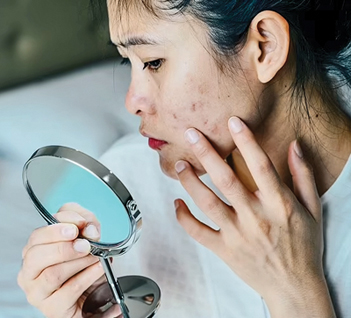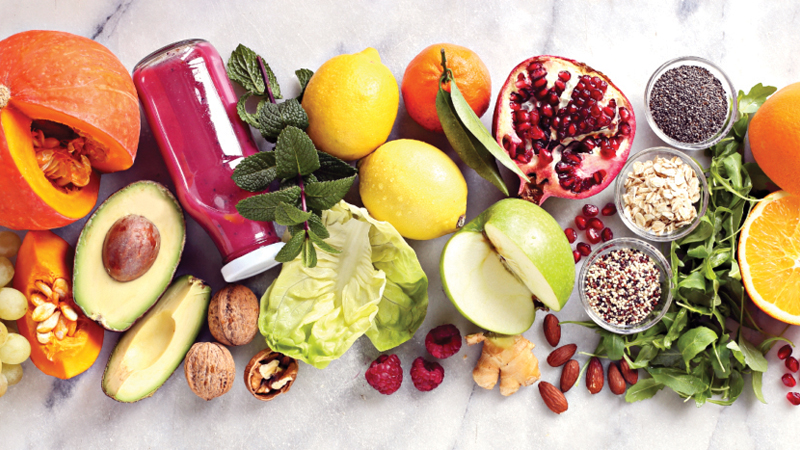The secret to clear and smooth skin could be as simple as taking a supplement and eating more healthy fats.
A study found that a combination of following the Mediterranean diet – which prioritises fish, nuts and olive oil – and taking an omega-3 supplement helped clear the skin of people with mild to moderate acne.
Researchers at the Ludwig Maximilian University of Munich, in Germany, studied the combination in 60 people who adhered to the diet and took a daily omega-3 supplement.
The secret to the clearer skin, according to researchers, was omega-3s in the form of foods that make up the Mediterranean diet and the supplements.
These healthy fats help shore up the structural integrity of cells throughout the body and can reduce inflammation, a leading cause of acne, which affects roughly 50 million Americans.
 Despite their importance for cellular health, an estimated 68 percent of adults and 95 percent of children in the United States do not consume enough omega-3s to meet their nutritional needs, according to the US Dietary Guidelines.
Despite their importance for cellular health, an estimated 68 percent of adults and 95 percent of children in the United States do not consume enough omega-3s to meet their nutritional needs, according to the US Dietary Guidelines.
While people can get their omega-3s from foods like salmon, walnuts, and canola oil, there are also supplements on the market for $15 to $30.
Of the 60 individuals in the latest study published in the Journal of Cosmetic Dermatology, 98.3 percent were deficient in omega-3s at the start. Acne severity lessened significantly in those who reached target omega-3 fatty acid levels during the study.
The Dietary Guidelines for Americans 2015-2020 recommends 450-500 milligrams of omega-3 fatty acids per day.
The researchers concluded that following the Mediterranean diet and taking omega-3 supplements significantly reduced both inflammatory and non-inflammatory skin lesions and pimples, and also improved people’s quality of life.
They determined the efficacy of the diet and supplements together in influencing acne by measuring omega-3 levels in the blood. Those with higher levels saw greater improvement in their skin.
Dr Anne Guertler of the Ludwig Maximilian University of Munich and co-author of the study said: ‘Lifestyle interventions, including dietary recommendations, should not be considered in opposition to prescription medications, but rather as a valuable adjunct to any modern acne treatment plan.
‘Future studies should build on the foundation laid by our current findings in a randomised, placebo-controlled design to improve dietary recommendations for acne patients.’
There are three main types of omega-3 fatty acids: EPA, DHA, and ALA. EPA is a ‘marine omega-3’ because it’s found in fish, as is DHA. The best sources of EPA and DHA include salmon, mackerel, sardines, and cod liver oil.
Meanwhile, ALA is mainly found in oils used for cooking in many Mediterranean countries, including seed oils such as canola and soybeans, walnuts, kidney beans, chia seeds, and spinach.
Acne is often an inflammatory condition, and DHA and EPA are especially adept at reducing inflammation in the body.
Omega-3 fatty acids can also improve the skin barrier to protect it from irritants and maintain moisture, as well as regulate the production of sebum, the poor clogging oily substance that leads to acne.
The Mediterranean diet is largely made up of omega-3-rich foods. In addition to reducing one’s risk of heart disease, obesity, and dementia, it has a protective effect against stroke, dementia, and can extend one’s life.
Walnuts, salmon, flax seeds, and sardines are some of the many foods that make up the much-lauded diet inspired by the culinary traditions of southern European countries bordering the Mediterranean Sea.
The American Heart Association formally endorsed the diet for heart health when a study conducted by researchers affiliated with the AHA found that women with high adherence scores of six or higher were 23 percent less likely to die from all causes, while those with a score of four or five had a 16 percent lower risk.
The diet, first researched and recommended in the mid-20th century, is based on the diets in countries that border the Mediterranean Sea, borrowing food traditions from Spain, Italy, Greece, and Morocco, among others, areas that when the diet was developed had lower rates of heart disease and other chronic conditions.
It comprises veggies and fruits and prescribes cutting back on red meat and incorporating healthy fats, especially extra virgin olive oil, seed oils, nuts, beans, olives, and avocados.
The diet also recommends exercise, which is the first dietary pyramid to do so.
Two locations along the Mediterranean where this style of eating is customary are known as blue zones – areas where people consistently reach 100 years old.
-Daily Mail.uk









